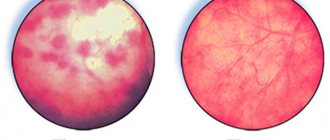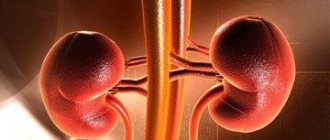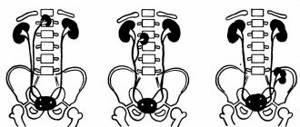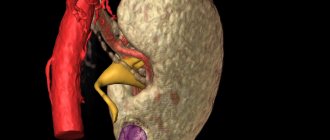The question, what is nephropathy, is always asked by patients who are encountering this disease for the first time. The pathological condition of the body occurs due to damage to the parenchyma and glomeruli in the kidneys. Because of this, the organ of the urinary system stops working fully, and dangerous complications develop. As the disease progresses, the filtration capabilities of the kidneys deteriorate. But if a person knows well what nephropathy is and consults a doctor in a timely manner, he manages to avoid serious health complications.
Definition
The term “nephropathy” itself does not indicate a specific disease. This is how doctors designate a kidney pathology in which connective tissue grows, affecting the remaining cells of the parenchyma and renal tubules. As a result, the function of both organs, which serve as filters on the path of blood flow, purify the blood and remove urine, is disrupted.
Nephropathy (ICD code 10) is a disease that may not manifest itself in any way while the kidneys cope with the increased load, and there are enough unchanged cells to function normally. However, after a certain period of time, the connective tissue spreads so much that changes appear in the composition of urine and blood, and intoxication of the body occurs.
This is why nephropathy is dangerous. What is it and where does the disease come from?
Causes of the disease
People who have been diagnosed with nephropathy are interested in what it is and what are the reasons for the development of such a pathology? This disease develops against the background of underlying kidney diseases. According to medical statistics, in 1/3 of cases, patients with nephropathic kidney damage suffer from diabetes mellitus. Gout often causes a complication in the form of nephropathy. There are other reasons that explain why renal nephropathies occur.
They are presented in the following list:
- endocrine diseases;
- disruption of metabolic processes;
- malignant neoplasms outside the kidneys;
- strong radioactive radiation;
- defects of the urinary organs that are congenital in nature;
- intoxication of the body with chemicals, poisons, heavy metals;
- side effect from medication use;
- pregnancy.
In general, this disease can have a different nature (including undiagnosed genesis). But in any case, the pathological process is always accompanied by disruption of the kidneys, as well as disruptions in the functioning of other internal organs.
Diabetic
It usually appears in the later stages of diabetes and is considered the most serious complication, threatening complete kidney failure. Presumably, the provoking factors are:
- poor circulation in the kidneys caused by a malfunction of carbohydrate metabolism, which, in turn, affects the condition of the blood vessels, making them brittle and narrowing the lumen;
- prolonged hyperglycemia, which upsets metabolism;
- genetic predisposition to the occurrence of diseases of this type.
Let's look at the stages of diabetic nephropathy:
- Stage 1 - renal hyperfunction or hyperfiltration;
- Stage 2 – microalbuminuria;
- Stage 3 – proteinuria;
- Stage 4 - severe nephropathy (nephrotic syndrome).
Folk remedies
In the treatment of nephropathy, auxiliary methods of alternative medicine can be used. This treatment is based on taking decoctions and infusions. The following recipes will be effective and at the same time safe.
- Cowberry. This berry has a positive effect on kidney function. It has a diuretic and anti-inflammatory effect. It is used in the treatment of nephropathy as follows. Cover the lingonberry fruits with sugar, the components are taken in equal proportions. Pack the mixture into jars, close them with lids and place in a cool place. When the mass releases juice, it can be used for therapeutic purposes. For this, 1 tbsp. l. The medicine is diluted with half a glass of warm boiled water. The drink should be consumed as a regular compote 1-2 times a day. This must be done until all portions of the mixture are finished.
- Watermelon rind. The watermelon peel is simply brewed and drunk like ordinary tea. This medicine is good at reducing swelling in the body by stimulating the process of urination and removing stagnant fluid in the body.
- A decoction of bearberry leaves. This remedy is advisable to use for nephritis. 1 tbsp. l. Leaves of the plant need to be poured with 250 ml of water and simmered over low heat until a third of the liquid has evaporated. The medicine is taken half an hour after eating in small sips. You need to use the decoction in 3 approaches.
- A decoction of blackberry roots. Grind the raw materials in a coffee grinder, 1 tbsp. l. pour 5 liters of water and cook under the lid until half the liquid has boiled away. Cool the broth and filter. Drink ½ glass 3 times a day.
- Liquorice root. 1 tbsp. l. pour a glass of water over the raw materials and simmer over low heat for a quarter of an hour. Then turn off the heat and leave the product for another half hour. When it has cooled, you should add a decoction of birch leaves and nightshade prepared in advance using the same principle (both components are taken equally). The medicine should be taken 30 ml after meals 4 times a day.
- Beans. Pour 50 g of dry bean leaves into 1 liter of boiling water and keep in a closed container for 3 hours. Strain the resulting infusion thoroughly and take half a glass for a month. This folk remedy effectively lowers sugar levels and also normalizes kidney function. Therefore, first of all, it is recommended for patients with diabetic nephropathy.
- Concentrated decoction of birch buds. Normalizes the functioning of the urinary system, removes excess fluid from the body. To prepare it, 2 tbsp. l. raw materials are poured with 300 ml of water, put on fire and brought to a boil. After this, the broth is poured into a thermos, tightly closed with a lid and left for another 30 minutes. Take the medicine 50 ml 4 times a day. The course of treatment continues for 14 days.
- Alcohol tincture of propolis. In fact, there is no point in preparing it at home, since it is sold without a prescription in every pharmacy. Its use helps to cope with persistent hypertension. But special care must be taken, since this medicine can cause a severe allergic reaction. You need to take it 20 drops three times a day a quarter of an hour before meals. The drops have a rather specific taste, so you can dilute them with half a glass of water.
Despite the fact that folk remedies are considered relatively safe, they should only be used for nephropathy with the permission of the attending physician. Some recipes may not be compatible with the prescribed medications, and there is also the concept of hypersensitivity to certain substances that make up a particular medicinal plant. Therefore, before starting therapy, it is also recommended to conduct an allergy test if a certain ingredient will be used for the first time.
Toxic
Developing, as the name suggests, as a result of exposure to various toxic substances on the body. There are 2 subgroups inside:
- specific, caused by toxic substances that negatively affect kidney tissue directly (lead, mercury, chromium, arsenic and others);
- nonspecific, occurring during general poisoning, since any poisons pass through the kidneys into the bloodstream.
These are the main causes of this type of nephropathy.
This form of nephropathy is often experienced by people who work in enterprises associated with the processing of heavy metals, as well as those living in settlements with unfavorable environmental conditions, for example, near metalworking plants, mining sites or production sites of toxic substances.
In this case, the kidneys suffer greatly. Symptoms of the disease and treatment will be presented below.
Classification
Nephropathy is usually classified, first of all, by the nature of its development. According to this criterion, the disease is divided into:
- Diabetic. Develops in severe, complicated diabetes mellitus.
- Hypertensive. This type of nephropathy includes several subtypes. The tubulointerstitial type of hypertensive nephropathy develops in the presence of autoimmune diseases and quickly leads to kidney damage. The ischemic type is a consequence of atherosclerotic damage to the renal arteries. Toxic hypertensive nephropathy results from poisoning with poisons, toxins, and chemical elements.
- Paraneoplastic. This type of nephropathy develops when a cancerous tumor forms.
- Reflux nephropathy. This type of disease is characterized by a violation of the outflow of urine when it backflows. Most often found in children.
- Nephropathy of pregnancy. In some cases, it becomes the cause of complicated childbirth, especially in the presence of such a dangerous condition as preeclampsia.
- Oxalate. This form of pathology is one of the most common, especially in children. Its main cause is hereditary predisposition.
Nephropathy developing during pregnancy
Doctors quite often encounter this complication of pregnancy. A woman with a similar diagnosis requires hospital treatment under constant medical supervision.
What are the signs of nephropathy?
The course of the disease is characterized by changes in blood clotting, increased permeability of vessel walls, and the anticoagulant and antiplatelet properties of blood cells sharply deteriorate. The result is blood that is too thick, unable to penetrate all cells in sufficient volume, and accordingly, the supply of oxygen and nutrients to all tissues of the body of the mother and fetus is disrupted.
Often, such a pathology is observed in pregnant women under the age of 19 and over 35 years old, who are overweight, high blood pressure, kidney disease, hypertension and such bad habits as smoking. The risk of developing nephropathy is increased in women carrying their first child or several children at the same time.
Let's consider hereditary nephropathies. The occurrence is based on a disturbance in the functioning of chromosomes and a mutation of one or several genes at once, which is passed on to descendants. These changes can be caused by a viral disease, prolonged hypothermia, or bacterial infections.
This pathology can proceed hidden for years, then manifesting itself as sharp pain in the lumbar spine, swelling, especially in the kidney area, increased blood pressure, and the appearance of blood in the urine.
Diagnosis and treatment of pathology
Diagnosis of nephropathy (regardless of its type) occurs in accordance with the following plan.
- The patient undergoes an ultrasound scan of the kidneys.
- Specific tests are performed in the laboratory to help identify urine calcification.
- Biochemical urine tests.
- Routine urine tests (help detect salt crystals).
After the diagnostic procedures have been performed, the doctor decides whether the patient needs to be hospitalized. The specialist is guided by the severity of the clinical picture and the complexity of the course of the underlying disease that caused nephropathy. For example, toxic and drug-induced nephropathies require high-quality treatment in a hospital setting under the strict supervision of doctors.
Treatment is carried out in the following areas:
- the doctor eliminates the factor that caused the disease;
- symptomatic therapy is carried out, during which the symptomatic manifestations of the disease (swelling, diuresis disturbances, high blood pressure) are eliminated.
An exact treatment plan is drawn up after the specialist determines the type of pathology. If the disease occurs against the background of diabetes mellitus, the patient is prescribed a diet for renal nephropathy. Doctors often recommend hemodialysis procedures.
The selection of medications for the treatment of nephropathy is carried out by a doctor on an individual basis.
The specialist focuses on the underlying disease that led to nephropathic kidney pathology.
For all types of nephropathies, the following medications are used:
- diuretics (Veroshpiron, Furosemide);
- complexes of vitamins (especially from group B) or medications that contain magnesium and potassium (elements that are excreted from the body along with urine), nicotinic and ascorbic acids;
- medications that improve blood flow (Pentoxifylline);
- drugs that normalize the functioning of the renal glomeruli, which are responsible for the quality of urine filtration (Fitolysin);
- antihypertensive medications that help lower blood pressure and bring it back to normal (Captopril);
- Antibacterial and anti-inflammatory medications are prescribed to patients with nephropathy accompanied by glomerulonephritis or pyelonephritis.
If nephropathy is diagnosed in a pregnant woman, treatment is carried out only in an inpatient setting.
The therapeutic course includes:
- diuretics;
- protein-rich medicinal formulations;
- antiplatelet agents;
- potassium preparations;
- antispasmodics;
- antihypertensive drugs.
Toxic nephropathy is treated using gastric lavage, plasmapheresis, forced diuresis, and hemodialysis. When doctors manage to stabilize hemostasis, they carry out anti-shock therapy.
Dysmetabolic nephropathy manifests itself mainly in childhood and is treated according to the following principles:
- carrying out work to normalize lifestyle;
- therapy using medications and vitamins A, E, B6;
- strict diet.
Often, for nephropathies of various types, the patient is given IV drips using saline solution mixed with glucose. This composition helps stabilize the acid-base balance and reduces the amount of salt in the patient’s body. If there is a threat that a patient with nephropathy will have complete kidney failure, he is prescribed an extracorporeal detoxification or hemodialysis procedure. In the first case, the blood is cleansed of toxic components using special equipment that duplicates the work of real kidneys.
Treatment of nephropathy with medications must be supplemented with a special diet and drinking regimen.
The daily diet of a person with such kidney pathology is compiled taking into account the following principles:
- the amount of salt in food should be kept to a minimum;
- include oatmeal and buckwheat porridge in the menu;
- drink fruit drinks from raspberries, lingonberries, strawberries;
- consume small amounts of fermented milk products containing a minimum of fat;
- exclude animal proteins (especially those containing large amounts of fat);
- eat low-fat fish;
- eat a lot of fruits, vegetables and greens.
The nephropathy diet prohibits the consumption of the following foods and drinks:
- Alcohol.
- Baking, confectionery, sweets.
- Canned food.
- Smoked, salted, spicy, fried, marinated dishes.
If the diagnosis of nephropathy is confirmed, the person must be hospitalized and undergo a set of measures designed to support the weakened body.
The main task of a medical specialist at this stage is to normalize the condition of the kidneys. To do this, you need to relieve swelling, stabilize the daily level of urine output, regulate hemodynamics, and normalize blood pressure.
Traditional methods of treating nephropathy
Traditional recipes will help normalize the patient’s condition with nephropathy. For example, lingonberries can be mixed with sugar in a 1:1 ratio and the resulting composition can be used as a diuretic. Lingonberry mixture will help strengthen the immune system, remove swelling, and relieve inflammation in the kidneys. A decoction of watermelon rinds will be a good helper in the fight against swelling and inflammatory processes in the kidneys.
Another good way to combat nephropathy is to use a decoction based on fennel fruits. It improves metabolism, has a beneficial effect on digestive processes, and normalizes kidney function.
The use of folk remedies against nephropathy should be agreed with the attending physician. Remember that self-medication for kidney pathology leads to adverse consequences and aggravates the underlying disease.
Treatment of each patient with kidney pathology is carried out individually. There is no one universal therapeutic regimen that would help cope with various types of nephropathy. The doctor selects treatment tactics taking into account various factors, takes into account the causes of nephropathic pathology, as well as the individual characteristics of the human body.
How to prevent the occurrence of the disease?
Prevention is very important in the case of nephropathy.
Of course, it is impossible to give an absolute guarantee that nephropathy will not affect a person suffering from one of the diseases that provokes it. However, by following some simple rules, it is possible to significantly reduce the risk of kidney damage by strengthening the urinary, circulatory and cardiovascular systems:
- frequent and long stays in the fresh air;
- exercise or any vigorous activity;
- giving up cigarettes and alcohol;
- blood sugar tracking;
- regular general blood and urine tests, ideally annually;
- weight and blood pressure control;
- sufficient fluid intake, which today can be calculated using various applications at home;
- the basis of the diet should be light food containing little fat, without excess proteins and carbohydrates;
- periodic preventive examinations - it is easier to cure any disease if caught at an early stage.
Following these recommendations will ensure that you never face a diagnosis of nephropathy. What it is, it’s better not to know.
Complications
Nephropathy is a complication of previous diseases, but the presence of such a pathology can lead to much more dangerous conditions. Nephropathy requires immediate treatment and elimination of its cause.
We are talking about kidney failure, in which all kidney functions are impaired. In this regard, the water-electrolyte and nitrogen balance is disturbed (normally, the amount of nitrogen absorbed by the organ = the amount of nitrogen excreted). Lack of fluid or its excess with disturbed water-electrolyte balance and lack of vital electrolytes (calcium, magnesium, potassium, sodium) leads to thrombosis, sunken eyes, swelling of organs, ascites (abdominal dropsy), heart problems, mental disorders and other pathologies . Kidney failure can cause death.
The addition of infection threatens the occurrence of chronic diseases - pyelonephritis and cystitis (inflammatory process in the bladder).
Nephropathy can cause urolithiasis, anemia (anemia) and arrhythmia (irregular heart rhythm and irregular heartbeat).
The biggest and “final” complication of affected kidneys is death.
Symptoms
In the early stages of disease progression, no symptoms may be observed at all. But as it develops, the following alarming signs appear:
- feeling of thirst;
- weakness;
- increased fatigue;
- headache;
- pain at the site of projection of the kidneys.
In the later stages, the clinical picture is supplemented by the following signs:
- visible swelling of tissues;
- vascular pressure increases;
- protein structures appear in urine;
- Symptoms of pyelonephritis may occur if infectious agents penetrate the organ.
Etiology
- the presence of metabolic disorders (diabetes mellitus, gout, etc.);
- poisoning of the human body with heavy metals;
- long-term use of certain pharmaceuticals, such as anti-inflammatory drugs, analgesics and anticonvulsants;
- bearing a child;
- the effects of radiation on the human body;
- the presence of extrarenal neoplasms of a benign and malignant nature;
- industrial and household intoxication;
- anomalies in the development of the kidneys and urinary tract, etc.










